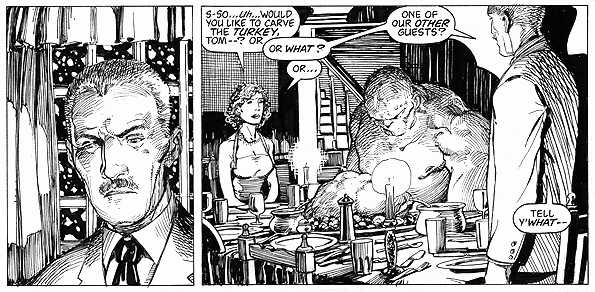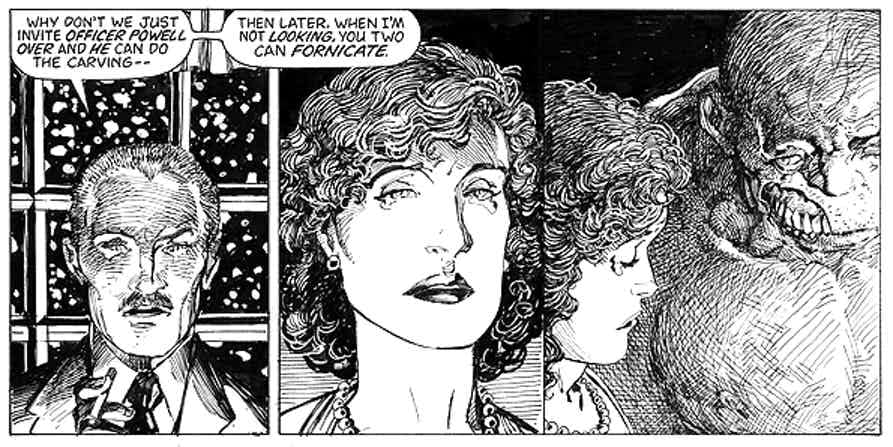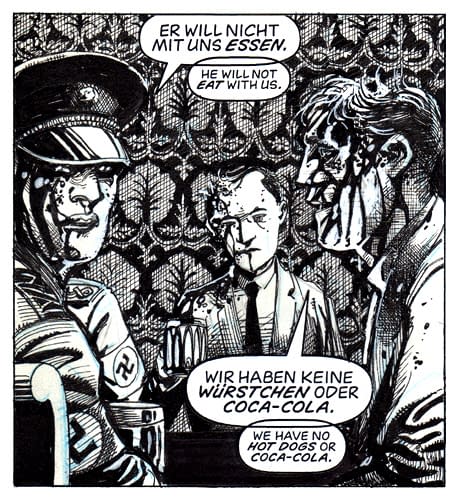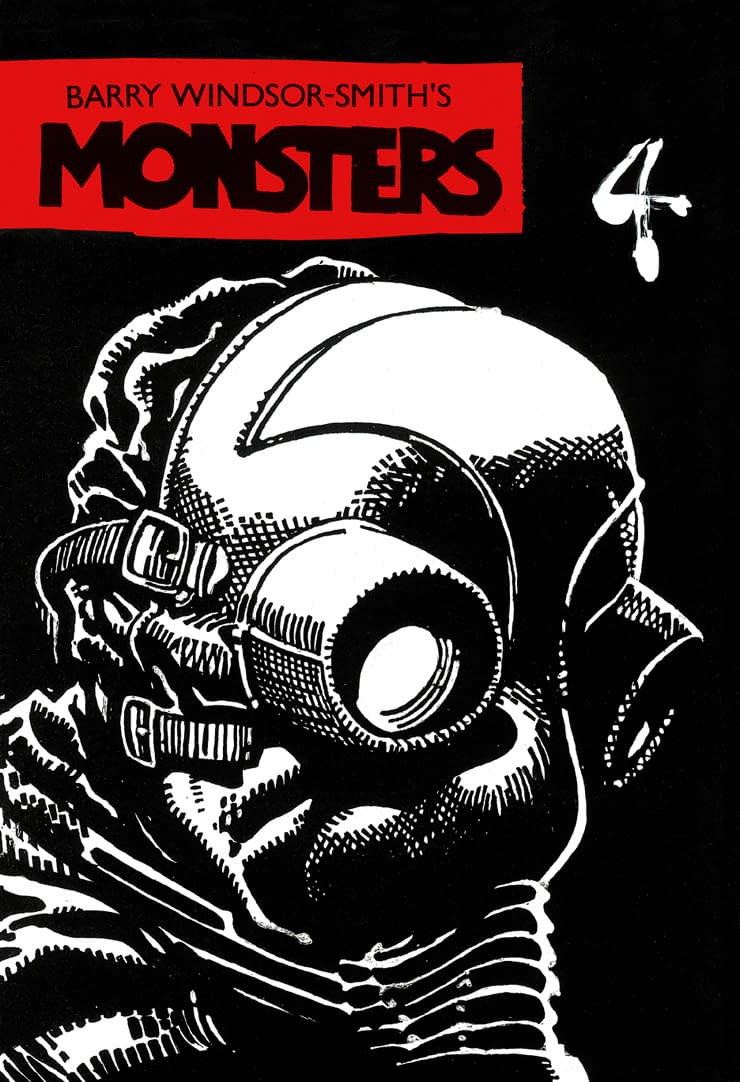Post by Deleted on May 30, 2020 2:39:21 GMT -5
Looks like 2021 will finally see the release of Barry Windsor-Smith's OGN Monster
Here's Fantagraphics write up of the book...
and some sample art...





there's more sample at in the linked Bleeding Cool article.
While I am a fan of a lot of stuff BWS has done, sometime around the Storyteller series I found myself enjoying his work much less. I still like the series in Storyteller, but not as much as I thought I would. Thinking back,I felt the same way about Rune from Malibu, so the shift in my enjoyment may have been a little earlier than that. So while I am curious to finally see this, I am not sure I am on board. The sample pages don't pull me is all that much either, so this may be a wait and see for me, and I may read it on something like Hoopla first before deciding if I will add it to my library. Which feels odd to me, because there was a time when BWS was an instant buy for me.
-M
Once upon a time, in 1984, it was a planned Hulk story called Thanksgiving by Barry Windsor-Smith, which portrayed the Hulk's existence as a result of abuse Bruce Banner suffered as a child. The idea was then used by Bill Mantlo in the ongoing Hulk comic book revealing the Hulk to be an expression of what was then dubbed schizophrenia, now dissociative identity disorder and more commonly multiple personality disorder. Peter David credits Mantlo for inspiring his own work on the character, which became so seminal, defining the character for a generation.
Some state that Mantlo simply stole the idea, and that seems to have been Windsor-Smith's interpretation. But talking to industry figures, the consensus seems to be that Mantlo didn't steal it, but was referring to it. Knowing the story existed, presuming it would be published by the time his issue was out, and referring to it when writing his own. Expanding upon the original idea, with his own concepts of three externalised figures, Guardian, Goblin and Glow, representing Freudian aspects of the Hulk and Banner's mind, conjured up by the Crossroads world around him.
Barry Windsor-Smith pulled his Hulk story in protest and began to rework it for other publication plans. First to Dark Horse Comics where it would have been called Big Red, but he fell out with publisher Mike Richardson over the Storyteller series. He took the projects to DC Comics, where it would have been recreated with new characters as a graphic novel, Monster. However, that project failed as Karen Berger and Paul Levitz refusing to allow Windsor-Smith to use certain vulgarities in the comic, and a now-planned use of the c-word was too far for DC then (though commonplace in Hellblazer now). What was originally a 22-page story was now over 270 pages
Fantagraphics published his similarly-withdrawn X-Men story, Lifedeath III as the Storyteller spinoff, Adastra In Africa. It was hoped something similar could be achieved with Monster. And that's just what happened. Barry Windsor-Smith's Monsters is now scheduled for January 19th, 2021 and is 380 pages long.
Monsters, he says, is about "two disparate American families fatefully connected by an abandoned Nazi project in genetic engineering that has been covertly revived by the U.S. government. This ground-breaking novel explores the disastrous effects of a Nazi program of genetic engineering, discovered at the close of World War II, upon two American families. Told through intimate, naturalistic dialog and drawings, this tale of the cascading legacy of profound evil blazes new trails in revealing the capacity of comics to be a powerful storytelling medium."
Some state that Mantlo simply stole the idea, and that seems to have been Windsor-Smith's interpretation. But talking to industry figures, the consensus seems to be that Mantlo didn't steal it, but was referring to it. Knowing the story existed, presuming it would be published by the time his issue was out, and referring to it when writing his own. Expanding upon the original idea, with his own concepts of three externalised figures, Guardian, Goblin and Glow, representing Freudian aspects of the Hulk and Banner's mind, conjured up by the Crossroads world around him.
Barry Windsor-Smith pulled his Hulk story in protest and began to rework it for other publication plans. First to Dark Horse Comics where it would have been called Big Red, but he fell out with publisher Mike Richardson over the Storyteller series. He took the projects to DC Comics, where it would have been recreated with new characters as a graphic novel, Monster. However, that project failed as Karen Berger and Paul Levitz refusing to allow Windsor-Smith to use certain vulgarities in the comic, and a now-planned use of the c-word was too far for DC then (though commonplace in Hellblazer now). What was originally a 22-page story was now over 270 pages
Fantagraphics published his similarly-withdrawn X-Men story, Lifedeath III as the Storyteller spinoff, Adastra In Africa. It was hoped something similar could be achieved with Monster. And that's just what happened. Barry Windsor-Smith's Monsters is now scheduled for January 19th, 2021 and is 380 pages long.
Monsters, he says, is about "two disparate American families fatefully connected by an abandoned Nazi project in genetic engineering that has been covertly revived by the U.S. government. This ground-breaking novel explores the disastrous effects of a Nazi program of genetic engineering, discovered at the close of World War II, upon two American families. Told through intimate, naturalistic dialog and drawings, this tale of the cascading legacy of profound evil blazes new trails in revealing the capacity of comics to be a powerful storytelling medium."
Here's Fantagraphics write up of the book...
Legendary cartoonist Barry Windsor-Smith tells the story of Bobby Bailey, who joins the military in 1964 – and there be monsters, real and metaphorical.
In this pen-and-ink graphic novel, in 1964, Bobby Bailey is recruited for a U.S. military experimental genetics program that was discovered in Nazi Germany 20 years prior. His only ally, Sergeant McFarland, intervenes to try to protect him, which sets off a chain of events that spin out of everyone's control. As the titular monsters multiply, becoming real and metaphorical, literal and ironic, the story reaches its emotional and moral reckoning. Windsor-Smith has been working on this passion project for more than 35 years, and Monsters is part intergenerational family drama, part espionage thriller, and part metaphysical journey. Trauma, fate, conscience, and redemption are just a few of the themes that intersect in the most ambitious (and intense) graphic novel of Windsor-Smith's career. Black and white illustrations.
In this pen-and-ink graphic novel, in 1964, Bobby Bailey is recruited for a U.S. military experimental genetics program that was discovered in Nazi Germany 20 years prior. His only ally, Sergeant McFarland, intervenes to try to protect him, which sets off a chain of events that spin out of everyone's control. As the titular monsters multiply, becoming real and metaphorical, literal and ironic, the story reaches its emotional and moral reckoning. Windsor-Smith has been working on this passion project for more than 35 years, and Monsters is part intergenerational family drama, part espionage thriller, and part metaphysical journey. Trauma, fate, conscience, and redemption are just a few of the themes that intersect in the most ambitious (and intense) graphic novel of Windsor-Smith's career. Black and white illustrations.
and some sample art...





there's more sample at in the linked Bleeding Cool article.
While I am a fan of a lot of stuff BWS has done, sometime around the Storyteller series I found myself enjoying his work much less. I still like the series in Storyteller, but not as much as I thought I would. Thinking back,I felt the same way about Rune from Malibu, so the shift in my enjoyment may have been a little earlier than that. So while I am curious to finally see this, I am not sure I am on board. The sample pages don't pull me is all that much either, so this may be a wait and see for me, and I may read it on something like Hoopla first before deciding if I will add it to my library. Which feels odd to me, because there was a time when BWS was an instant buy for me.
-M
